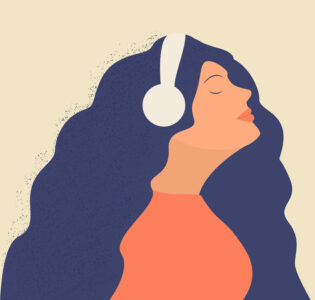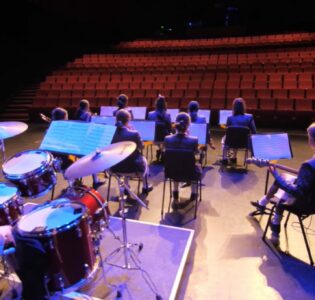Genazzano Institute – The Power of Music
‘It may be useful to think of playing a musical instrument as being equivalent to doing a full-body work out for your brain’.
Emily Tarrant
Reflections on music in lockdown and return to face to face learning
Emily Tarrant, Head of Jazz and Contemporary Studies, Genazzano FCJ College.
Intrinsically, we all know the power of music. The emotions it evokes when we hear our favourite song, or sing in the new year with friends and family. The rush of endorphins we feel as we attend our first live concert or go out dancing.
A body/brain response is experienced in these situations. Music is present in every culture and helps us to celebrate life events, feel happy or sad, worship, motivate, inspire, demonstrate and connect. If this is our experience when simply listening to music, what are the added benefits of actually learning an instrument and playing in an ensemble?
It may be useful to think of playing a musical instrument as being equivalent to doing a full-body work out for your brain. However, unlike many other mental and physical activities, science tells us that playing a musical instrument simultaneously activates nearly every region of the brain. Multiple senses and motor skills operate together and can lead to positive and long-lasting structural changes. Coordination is improved as hands, feet, lungs and tongues have to keep to a steady beat for a sustained amount of time. Concentration, reading and focus improve as information from sheet music is processed and transformed into physical action, in order to create sound. Listening skills are required to assess the quality of the sound being produced and how it blends with the ensemble. A complex process indeed – especially if you are doing all of the above while having to follow a conductor!
The benefits of learning an instrument have long been evident at Genazzano. Student engagement in music is high, with students typically retaining instrumental lessons and ensemble membership throughout the entirety of their schooling. Students report that while doing individual practice on their instrument, they are able to take a break from busy and sometimes stressful schedules. They enjoy being creative and using their minds and bodies in a completely different fashion. When playing in their ensembles, it is the social benefits of being in a group that students highlight as being very important to them. Learning to cooperate, overcome shyness, plan together, laugh together, overcome musical hurdles, and celebrate the musical successes positively affect their mood and sense of wellbeing.
As COVID-19 necessitated the need for lengthy lockdowns in Victoria during 2020, the internet came alive with people turning to music while in isolation. Whether it was to sign up for an online ukulele lesson, upload an Acapella App performance or present a live streamed concert, in isolation, people reached out to connect through music. As Genazzano adopted its Learning At A Distance Program during this time, students displayed increased flexibility to flip their learning platforms to include online Zoom lessons and the use of music software programs such as SmartMusic and Screencastify. Many students demonstrated an increased level of lesson attendance and homework completion throughout this period and most importantly, reported that playing their instrument helped relieve some of the fears, stress and anxiety they were experiencing due to being physically isolated from their cohort. A higher level of self-directed learning was observed and students reported that they noticed heightened levels of focus, improved memory and the ability to more effectively multitask. They also noticed the direct result of their increased focus and felt a sense of pride and achievement as their performance skills improved.
The return to regular schooling in 2021 has seen our musicians embrace their face-to-face lessons and rehearsals with gusto. “It’s so good to be in the same room again!” was the catch phrase of Term One. In fact, recent enquiries from parents and students alike centre on nurturing their connection with music: what ensembles are available to join, what student leadership opportunities are available in the Music Department, Music Camp, Generations in Jazz and can we compete again in the Victorian Schools Music Festival?
In all, there has been a marked increase in instrumental lesson enrolments, and ensemble membership in all areas of the Department is on the rise. Whether in lockdown or on campus, students are demonstrating that music is vital to their learning, health and wellbeing. As we learn more about the effect of music on the brain and mood, it is perhaps not surprising that this is taking place. This is the power of music.




